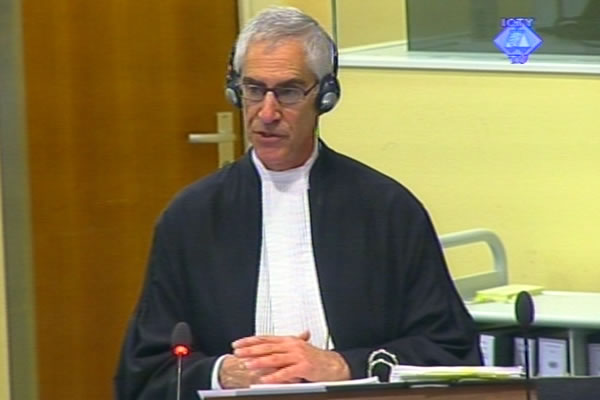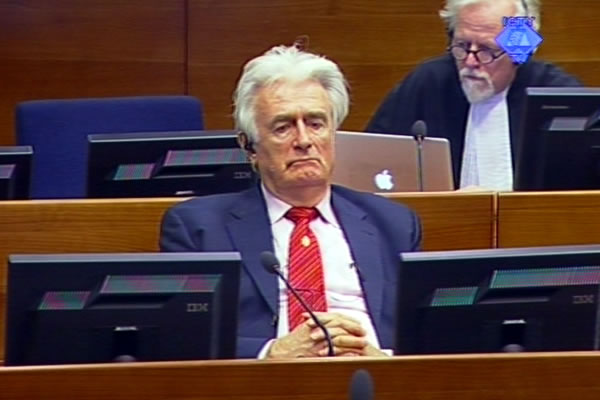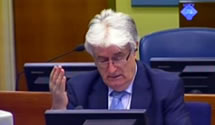Home
PROSECUTION: KARADZIC WILL HAVE MUCH TO CONTEST
As Radovan Karadzic argued, ‘my fingerprints aren’t on’ the crimes Serb forces committed in BH and asked the judges to acquit him on all counts in the indictment. The prosecution, on the other hand, contends that enough evidence has been called over the past two years to support Karadzic’s conviction. The former Republika Srpska president will have much to contest in his defense case, the prosecution insisted
 Alan Tieger, tuzilac na suđenju Radovanu Karadžiću
Alan Tieger, tuzilac na suđenju Radovanu Karadžiću The prosecution contends it has called sufficient evidence to prove all 11 counts in the indictment. Radovan Karadzic is charged with taking part in four joint criminal enterprises: forcible and permanent elimination of non-Serbs from large parts of BH, which reached the scale of genocide in some municipalities, the terror campaign in Sarajevo, taking UN staff hostage and the genocide in Srebrenica.
As prosecutor Alan Tieger said, Karadzic intended to establish an ethnically clean Serb state and wanted to implement that goal by ethnically cleansing the non-Serb population from parts of BH Serbs considered as their own. If it had been a mere matter of moving the people away from war-stricken areas or the evacuation of the people after natural disasters, as Karadzic qualified it, then there would not have been 280 mosques destroyed, the ethnically cleansed towns wouldn’t have been given new, Serb names, and any effort to return the people wouldn’t have been systematically thwarted.
The evidence showed that civilians were targeted by the Bosnian Serb artillery and snipers in Sarajevo. Military facilities were not the targets, the prosecutor insisted. The evidence also shows that the accused exercised command over the terror campaign in Sarajevo. Karadzic and Mladic could at any point set the ‘terror levels’ depending on their current political goals, the prosecutor noted. They either stepped up the campaign or halted it for a time, using it as ‘leverage’ in the negotiations with the enemy or international representatives.
Unlike the accused who claimed he had been dealing with ‘other issues’ and had not been aware of the murders in Srebrenica in July 1995, the prosecution contends that Karadzic, as the president and supreme commander of the RS armed forces, ‘kept an eye’ on the developments in the field. Karadzic was aware of the implications of the executions in Srebrenica. The prosecutor quoted military expert Richard Butler, who said in his evidence that Operation Krivaja 95 was followed the same lines as all the other VRS operations and that the army, police and civilian authorities kept Karadzic informed through the usual channels.
As prosecutor Tieger recalled, the ‘accused himself said that General Krstic planned the Srebrenica operation in his presence’ and boasted that the operation was part of his order, Directive Seven. Karadzic also said that his aim was to ‘raise the temperature to the boiling point’. Speaking about the intent to destroy Bosnian Muslims, the prosecutor recalled that the Serb forces under the command of the accused executed –according to the current data –at least 6,672 Muslims to ‘implement their genocidal plan’.
Speaking of the other municipalities where the ethnic cleansing reached the scale of genocide, the prosecutor highlighted the crimes in Zvornik and Prijedor where thousands were targeted in separate incidents; the goal was their ‘physical destruction’. The prosecutor listed a number of incidents in the Zvornik area, such as the execution of 30 men in early April 1992 in Zvornik, 160 men in Karakaj, 190 in Gero’s slaughterhouse, 88 in the Culture Hall and 300 to 350 men killed in the Brda area near Prijedor. The prosecutor also talked about the killing of the prisoners in Keraterm and Omarska and the execution of about 200 men at Koricanske Stijene.
As prosecutor Tieger concluded, the evidence pointed clearly that there was a dolus specialis, a specific intent to annihilate Muslims and Croats as ethnic groups entirely or in part in those municipalities. There also was the requisite actus reus, the material element of the crime of genocide.
After the prosecution presented its arguments, presiding judge O-Gon Kwon concluded the Rule 98 bis hearing indicating that the Trial Chamber would inform its decision on Thursday, 28 June 2012.Fotografije
Vezani izvještaji
- Predmet : Karadžić
- 2012-06-11 KARADŽIĆ TRAŽI DA BUDE OSLOBOĐEN
- 2012-06-05 SUDIJSKI "UVIĐAJ" NA MJESTU SREBRENIČKIH ZLOČINA
- 2012-05-30 TUŽILAC SE PROTIVI IZDAVANJU OBAVEZUJUĆEG NALOGA ICMP
- 2012-06-22 KARADŽIĆU OSTAJE "BRANILAC U PRIPRAVNOSTI"
- 2012-06-28 KARADŽIĆ OSLOBOĐEN OPTUŽBE ZA GENOCID U OPŠTINAMA
- 2012-06-28 KARADŽIĆ POZIVA GENERALE GALIĆA I MILOŠEVIĆA
TV Tribunal 546
A GDJE SU OTISCI PRSTIJU?: Radovan Karadžić osporava dokaze tužilaštva
NEPOŠTOVANJE SUDA: Šešelj sposoban ali ne i spreman za svedočenje u svoju odbranu
POSLJEDNJI NA LISTI ČEKANJA: Suđenje Goranu Hadžiću u oktobru ove godine


